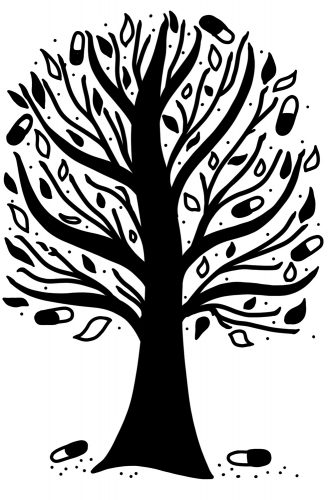
Her eyes widened in disbelief.
Yes, he thought, the burnt romantic, thinking and therefore believing that there’s something to preserve in all this, something sacred to protect, to fight for, to prove. Experience had taught him that grief could sacrifice itself to the very principles that begot it. Death was the only tomorrow that ever truly arrived, a ghosting in reverse.
“Let me ask a question,” he continued. “Have you ever caught a certain scent — the smell of cherry chapstick, wet leather, baking bread, the way smoke from a freshly lit cigarette wafts into the backseat of a car — and been immediately transported to a very particular time and place in your past? Something so specific that you recognize it immediately and feel it right to the marrow of your bones, as though it’s happening all over again? Like déjá vu, an event occurring again, but almost as though for the first time. Or can an old familiar song suddenly send you reeling back to your childhood and fill it in so thoroughly that you complete forget where you are in real time? If those things are gone, why are they so quick to mind?”
“These are just human experiences,” she said. “Everybody has memories. That doesn’t mean we’re supposed to walk around pretending they’re real.”
Bingo, he thought. He had her. She wanted to get existential? Fall back on protocol. When call-back visits got squishy along spiritual lines, push for a grounding of the soft- real. Offer options and conclude with anecdotes. Establish a new faith narrative. “I’m not here to deceive you, Mrs. Black,” he said. “Nor am I compelled to convince you that somehow you can have your husband back as an actual-actual corporeal reality. That would be absurd. My job is simply to ease you back into accepting a decision you yourself have already made, based not on my opinions and feelings but on the clinical history of hundreds of patients with whom we’ve worked closely and carefully. You, of course, are free to discontinue this course of treatment at any time. That’s your choice. But understand that any major life decision will carry with it a modicum of doubt. Even Jesus doubted. Doubt is intrinsic to faith, not opposed to it. Doubt is perfectly natural. Especially if the person undergoing the crisis is an intelligent, caring, thoughtful person who’s in touch with her feelings. Like you.”
He paused. She said nothing, so he went on. “Are you familiar that catchphrase from the early years of pharmacology, the one promising better living through chemistry?”
“Yes,” she said. “Of course.”
“Well, the unbounded optimism of the early fathers of modern pharmacology has been completely borne out by more recent discoveries in fields ranging from philosophy and neurobiology to quantum physics and evolutionary science,” he said. “What these various revelations tell us is that reality is a totally subjective phenomenon. Our senses ingest the primary evidence of the physical world and our brains turn that data into meaning. Our relationship with reality is not, and by its very nature cannot be, a one-to-one correspondence. Our brain filters, and must filter, the information it receives. For instance, the visual date of the world is absorbed by our optical receptors, but we don’t see what we see until that information is channeled by our brains and projected back onto the surface of the optical cortex. Reality is not the cause but the effect of our experiences in real time. In short, we create the story of ourselves. And not because we can, but because we must. To live in uncertainty is to die.”
“Jesus,” she sighed. “What does this have to do with my husband? Are you suggesting that I should be happy about committing to some kind of forced hallucination?”
“Well,” he said, “we prefer the term controlled schizophrenia. But yes, if you understand the truth that you are incapable of actually being immediately present in your own life, it’s not such a vulgar step to conclude that your memories are all you have. And from there it presents no great quantum leap to accept the fact that, given the real basis of reality, the only control you have is chemical. Your free will is, by definition, the incontrovertible freedom to chose your mental state. By its very nature and by the inherent mechanism of the only logic by which we can understand free will, it extends no further than that, Mrs. Black.”
“You really believe this garbage, don’t you?” she said. “This is ridiculous. It feels like I’m being sold a used car, and I’m starting to — ”
“What’s wrong?” he said, leaning forward in his chair. Suddenly Mrs. Black’s gaze was riveted to a spot on the wall to her left. “Are you okay?” he asked.
The eyes she turned on him were stricken, full of awe. “He just laughed,” she whispered. “Ben just laughed at me. He said, ‘You go, girl.’”
“That’s delightful,” he said. “You’re transitioning.” “I’m scared,” she said.
“Understandable,” he said. “As is your anger.” — to be continued
This is a new column introducing original works of short fiction by local authors. Tune in next week for the final installment of “Tree of Life” by Rick Levin.
(for Part I, visit the June 28 issue)